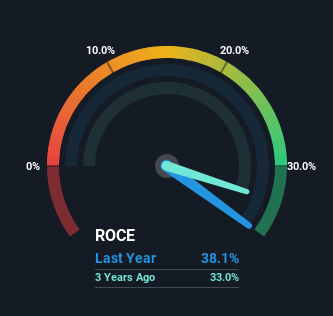- United States
- /
- Household Products
- /
- NYSE:CL
Returns At Colgate-Palmolive (NYSE:CL) Appear To Be Weighed Down

There are a few key trends to look for if we want to identify the next multi-bagger. Amongst other things, we'll want to see two things; firstly, a growing return on capital employed (ROCE) and secondly, an expansion in the company's amount of capital employed. If you see this, it typically means it's a company with a great business model and plenty of profitable reinvestment opportunities. So when we looked at Colgate-Palmolive (NYSE:CL), they do have a high ROCE, but we weren't exactly elated from how returns are trending.
Return On Capital Employed (ROCE): What Is It?
Just to clarify if you're unsure, ROCE is a metric for evaluating how much pre-tax income (in percentage terms) a company earns on the capital invested in its business. To calculate this metric for Colgate-Palmolive, this is the formula:
Return on Capital Employed = Earnings Before Interest and Tax (EBIT) ÷ (Total Assets - Current Liabilities)
0.38 = US$4.2b ÷ (US$16b - US$5.4b) (Based on the trailing twelve months to June 2024).
Therefore, Colgate-Palmolive has an ROCE of 38%. In absolute terms that's a great return and it's even better than the Household Products industry average of 19%.
Check out our latest analysis for Colgate-Palmolive

In the above chart we have measured Colgate-Palmolive's prior ROCE against its prior performance, but the future is arguably more important. If you're interested, you can view the analysts predictions in our free analyst report for Colgate-Palmolive .
How Are Returns Trending?
There hasn't been much to report for Colgate-Palmolive's returns and its level of capital employed because both metrics have been steady for the past five years. Businesses with these traits tend to be mature and steady operations because they're past the growth phase. So while the current operations are delivering respectable returns, unless capital employed increases we'd be hard-pressed to believe it's a multi-bagger going forward. This probably explains why Colgate-Palmolive is paying out 52% of its income to shareholders in the form of dividends. Unless businesses have highly compelling growth opportunities, they'll typically return some money to shareholders.
Our Take On Colgate-Palmolive's ROCE
In summary, Colgate-Palmolive isn't compounding its earnings but is generating decent returns on the same amount of capital employed. Although the market must be expecting these trends to improve because the stock has gained 60% over the last five years. But if the trajectory of these underlying trends continue, we think the likelihood of it being a multi-bagger from here isn't high.
On a final note, we've found 1 warning sign for Colgate-Palmolive that we think you should be aware of.
Colgate-Palmolive is not the only stock earning high returns. If you'd like to see more, check out our free list of companies earning high returns on equity with solid fundamentals.
New: AI Stock Screener & Alerts
Our new AI Stock Screener scans the market every day to uncover opportunities.
• Dividend Powerhouses (3%+ Yield)
• Undervalued Small Caps with Insider Buying
• High growth Tech and AI Companies
Or build your own from over 50 metrics.
Have feedback on this article? Concerned about the content? Get in touch with us directly. Alternatively, email editorial-team (at) simplywallst.com.
This article by Simply Wall St is general in nature. We provide commentary based on historical data and analyst forecasts only using an unbiased methodology and our articles are not intended to be financial advice. It does not constitute a recommendation to buy or sell any stock, and does not take account of your objectives, or your financial situation. We aim to bring you long-term focused analysis driven by fundamental data. Note that our analysis may not factor in the latest price-sensitive company announcements or qualitative material. Simply Wall St has no position in any stocks mentioned.
About NYSE:CL
Colgate-Palmolive
Manufactures and sells consumer products in the United States and internationally.
Established dividend payer with proven track record.
Similar Companies
Market Insights
Community Narratives



